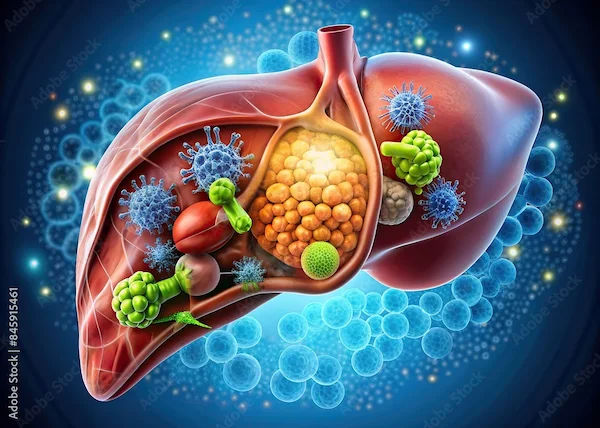Hepatitis E: Causes, Symptoms, and Prevention
Understanding what is hepatitis E and learning about its causes and risk factors, transmission, diagnosis, treatment and prevention strategies.

Written by Dr.Sonia Bhatt
Last updated on 3rd Jul, 2025

Hepatitis E is a viral infection that affects the liver, caused by the hepatitis E virus (HEV). In most cases, individuals recover fully without long-term liver damage. Also known as enteric hepatitis, as it affects the intestines.
The infection is more prevalent in regions with inadequate sanitation and limited access to clean water, particularly in parts of Asia and Africa. hepatitis E shares similarities with hepatitis A and spreads through the faecal-oral route. While generally mild, it can be more severe in pregnant women and may lead to complications for the baby. However, most individuals make a complete recovery.
Causes and Risk Factors of Hepatitis E
Hepatitis E is caused by the hepatitis E virus (HEV), and infection can occur through several routes:
Contaminated water: The most common way to contract hepatitis E is by drinking water that has been polluted with infected faeces.
Undercooked meat: People can sometimes become infected by eating undercooked pork, venison, boar, or shellfish.
Mother-to-baby transmission: A pregnant woman can pass the virus to her baby through the placenta.
Hepatitis E is present worldwide but is more widespread in low- and middle-income countries, where sanitation and food safety measures are insufficient. Travellers visiting these areas face a greater risk, especially those working in healthcare settings or refugee camps. Large outbreaks have been reported in overcrowded conditions, such as among displaced communities and refugees.
Symptoms of Hepatitis E
Hepatitis E can present with a range of symptoms, from mild to more severe. Some individuals may not experience any symptoms, while others may develop noticeable signs of infection. The symptoms of hepatitis E are often similar to those of other liver conditions and can sometimes be confused with other viral infections. Early detection and awareness of the symptoms are important, especially for those who are more vulnerable, such as pregnant women or those with compromised immune systems.
The first signs of hepatitis E can include:
Fever
Nausea and vomiting
Loss of appetite
Abdominal pain
A few days after the initial symptoms, additional signs may develop, such as:
Itching
Skin rash
Joint pain
Dark-coloured urine
Pale or clay-coloured stools
Diarrhoea
Yellowing of the skin or eyes (jaundice)
Acute hepatitis E is typically a short-term infection. In most cases, the body is able to clear the virus on its own, and the individual usually recovers within a few weeks without requiring specific treatment.
Chronic hepatitis E occurs when the body is unable to eliminate the virus, leading to a long-lasting infection. This is rare and generally affects people with weakened immune systems, such as those receiving immunosuppressive drugs following an organ transplant or individuals living with HIV or AIDS.
Diagnosis of Hepatitis E
To diagnose hepatitis E, your doctor will start by reviewing your medical history and asking about your symptoms. It’s important to mention any recent travel, particularly if you may have had exposure to water contaminated with sewage.
Diagnosis is typically confirmed through blood or stool tests. These tests are conducted in a laboratory to detect the virus, either by identifying its genetic material or antigens or by looking for antibodies to the virus in the blood or stool sample.
Treatment and Management of Hepatitis E
There is no specific treatment for hepatitis E. In most cases, the infection resolves on its own without the need for treatment.
For individuals with chronic hepatitis E and weakened immune systems, antiviral medications such as ribavirin may be used, or therapies that help boost the immune system, like interferon. These treatments are not safe for pregnant females.
For acute hepatitis E, there is no treatment that directly alters the course of the infection. As the condition typically resolves without complications, hospitalisation is generally not necessary. It's important to avoid medications that can harm the liver, such as paracetamol.
Hospitalisation may be required for individuals with fulminant hepatitis, a severe form of the disease, or for pregnant women with symptoms.
What are the Complications of Hepatitis E?
Travellers to regions with inadequate sanitation are at a higher risk of contracting hepatitis E. Certain groups are more vulnerable to severe outcomes, such as those having long-term liver damage or liver failure, including:
Pregnant females
People who have had solid organ transplants
Those with weakened immune systems
Pregnant individuals with hepatitis E, particularly in the third trimester, are at an increased risk of complications, such as:
Liver failure
Miscarriage
Stillbirth
Although rare, hepatitis E can also result in liver failure in people who are not pregnant. Individuals with compromised immune systems are more likely to develop a chronic (long-lasting) infection.
Prevention of Hepatitis E
Precautions about food and beverages that can be taken to reduce the risk of getting hepatitis E include:
Drink only from sealed containers
Avoid ice unless it’s made from safe water
Choose pasteurised milk
Eat food that has been cooked thoroughly and served hot
Avoid food that has been left out on buffet tables
Consume only raw fruits and vegetables if they have been thoroughly washed with clean water or peeled
If you are in or travelling to areas where hepatitis E is common or where there is an outbreak, additional measures include:
Drinking only bottled or treated water
Using safe water to wash food and eatables
Washing hands frequently, particularly before eating and after using the toilet
Yes, there is a vaccine called HEV p239 (Hecolin®), which is available in China and a few other countries. However, this vaccine has not yet undergone any trials in India and is currently not available in India.
Conclusion
Hepatitis E infections typically last between one to six weeks, although full recovery of the liver may take longer. Most cases are uncomplicated and people recover without complications. People with weakened immune systems may struggle to fight off the virus, which can result in a chronic infection (lasting several months or longer). Medication may be needed to help the body combat the virus.
While hepatitis E is rarely fatal for those who are not pregnant, the mortality rate for pregnant individuals can be as high as 30%. Some studies suggest that infants born to mothers who had hepatitis E during pregnancy may have a mortality rate of around 6%. If you are pregnant, particularly in the third trimester, healthcare professionals need to closely monitor both you and the baby. Hospitalisation may be required in some cases.
Consult Top Hepatologists
Consult Top Hepatologists

Dr. Srinivasa Reddy
Hepatologist
12 Years • MBBS, MD (General Medicine), DM (Hepatology),ASGE
Hyderabad
Myra Liver & Gastro Care, Hyderabad

Dr. Sushith C
General Physician
2 Years • MBBS
Bengaluru
PRESTIGE SHANTHINIKETAN - SOCIETY CLINIC, Bengaluru

Dr. E Prabhakar Sastry
General Physician/ Internal Medicine Specialist
40 Years • MD(Internal Medicine)
Manikonda Jagir
Apollo Clinic, Manikonda, Manikonda Jagir
(125+ Patients)

Dr. Akshatha Manjunath
General Surgeon
8 Years • MBBS, MS
Bangalore
Apollo Clinic Bellandur, Bangalore